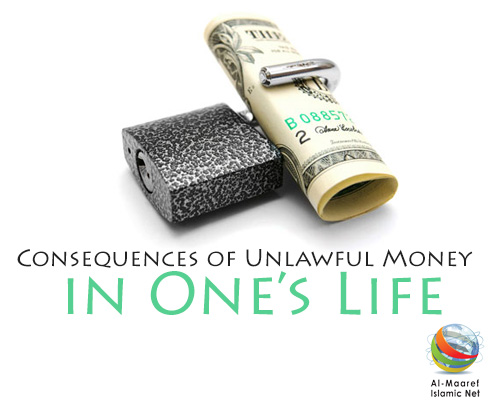The Most High God says in Luqman’s recommendation to his son,
﴾And swell not thy cheek (for pride) at men, nor walk in insolence
through the earth; for God loveth not any arrogant boaster﴿1
From among Luqman’s recommendations to his son is to turn away from the vices
which lead to man’s destruction and fall in the society because these vices have
to do with the moral relationship with the people. He, therefore, recommends his
son with humbleness and cheerfulness and non haughtiness, and he says, "And
swell not they cheek (for pride) at men…" i.e. do not turn your face with
hypocrisy away from the people and do not walk proudly on the earth. This is so
because God does not like the haughty person and does not like the one who
regards himself to be great, which leads him in turn to show off before the
people and which thus results in the cut off of the social relationships. This
is a psychological and moral disease and is an aspect of deviation, for the
spiritually and psychologically sound human being is never afflicted with such
doubts and fantasies. Henceforth, Luqman (God’s peace bestowed upon him) wanted
to fight all aspects of arrogance and self conceit through the blessed verse.
Sincerity in Knowledge and Work
From the conditions of the belief in The Most High God and of following the
straight path towards The Most Glorious and Reverent God in that all deeds be
for the sake of The Most High God. When we believe in The Most High God as a
crave towards happiness and perfection, then we have already known that they are
found with none save with The Most Glorified and High God.
The Most High God says,
﴾O ye men! It is ye that have need of God: but God is the One Free of
all wants, worthy of all praise﴿2
Henceforth, the worship must be for God Alone; and we must not, in
knowledge and work, turn towards anyone save The Most Glorified God: Such is
sincerity!
Self Conceit, Arrogance, and Hypocrisy
These traits are contradictory to sincerity i.e. to the work which is completely
for The Most High God. He who wants that his deed be completely dedicated for
The Most High God must fight these traits and expel them away from himself.
Still, what is meant by each of these traits?
The self conceit is that one deems his deed to be great and much and to be so
pleased and happy with it; and it is that one regards himself not to be
delinquent in anything.
The arrogance is to show the righteous deeds or the praiseworthy traits to the
people in order to gain a position in their hearts and in order to be renowned
among them for righteousness and straightforwardness.
As regards hypocrisy, it is a psychological state which makes the human being
elate himself over the others, and it originates from the self conceit.
From the gravest disobediences with which the human being may be afflicted are
these vices which thwart the work because it is meant for someone rather than
The Most High God; consequently, all the deeds turn to be valueless.
Still, there is even what is more dangerous than this i.e. the human being,
through this, becomes a worshipper for someone else rather than The Most High
God; he even reaches the stage of pretense of godhood as was the case of the
Pharaoh: The Most High God says,
﴾Truly Pharaoh elated himself in the land and broke up its people into
sections…﴿3
He elated himself means that he acted haughtily; his haughtiness led him to
pretend godhood as The Most High God says,
﴾O Chiefs! No good do I know for you but myself: therefore, O Human!
Light me a (kiln to bake bricks) out of clay, and build me a lofty palace, that
I may mount up to the God of Moses: but as far as I am concerned, I think
(Moses) is a liar﴿4
Arrogance and hypocrisy, therefore, led that weak man to:
1- Pretend godhood.
2- Fight The Most High God and His prophets.
3- Belie the prophets.
Because of this, The Most High God adds,﴾
And he was arrogant and insolent in the land, beyond reason, he and his
hosts: they thought that they would not have to return to Us * So we seized him
and his hosts, ad We flung them into the sea: Now behold what was the end of
those who did wrong﴿5
Hypocrisy
One may perform many deeds yet be surprised on the Day of Judgment with that his
work was in vain because it was not completely for the sake of The Most High God
as is related in the following noble discourse: “The angel will happily
ascend with the deed of the servant. When he ascends with his good deeds, The
Most Glorious and Reverent God will say, ‘Put them in Hell, for he did not want
Me from them.’”6
Also, it is related that The Concluding Prophet (God’s prayers and peace
bestowed upon him and his Household) said, “O bin Masoud! Beware of being
submissive and humble with the mankinds while you are, between you and your God,
insistent on disobediences and sins; The Most High God says, ?(God) knows of
(the tricks) that deceive with the eyes, and all that the hearts (of men)
conceal?7”8
The Signs of the Hypocrite
It is related that The Prince of the Believers Imam Ali (God’s peace bestowed
upon him) said, “The hypocrite has four signs: gets lazy when he is alone;
gets active when he is among the people; increases his work when he is praised;
and decreases his work when he is not praised.”9
As regards the self conceit, The Most High God says,
﴾Is he, then, to whom the evil of his conduct is made alluring, so
that he looks upon it as good, (equal to one who is rightly guided)? For God
leaves to stray who He wills and guides whom He wills﴿10
It is related that Abou Abdullah (God’s peace bestowed upon him) said, “Satan
said to his soldiers, ‘If I get command of three things in mankind, then I will
not care for whatever he does because it will not be accepted: If he finds his
work to be much; forgets his sins; and becomes self conceitful.’”11
As regards the arrogance, The Most High God says,
﴾But those who reject Our Signs and treat them with arrogance, they are
companions of the Fire, to dwell therein (for ever)﴿12
It is related that God’s prophet (God’s prayers and peace bestowed upon him and
his Household) said, “There are three whom God is not going to speak to, is
not going to look at, is not going to purify, and is going to torture a lot on
the Day of judgment: an adulterer Sheikh, a tyrant king, and an arrogant poor.”13
It is also related that Abou Abdullah (God’s peace bestowed upon him) said,
“There is in Hell a valley, named Saqar, for the arrogant ones. It complained to
The Most Glorious and Reverent God about the intensity of its hotness and asked
His Permission to breathe. When it breathed, it burnt Hell.”14
How to Get Rid of These Dangerous Diseases?
As we have seen, the rational human being must not fall in these destructive
traits because they will lead him to lose both this life and the hereafter. The
one who is afflicted with these diseases must try with his determination and
power to get rid of them in any possible way. We are going to mention a
scientific and practical cure to get rid of these diseases.
The main cause for the presence of these diseases is that the human being
regards himself to be rich, knowing, and capable and that he regards the people
around him to be so. The first step he has to take, therefore, is to know that
he is poor, needy, and weak; that all the other people can not afford him
anything or do anything; and that all the things are in the Hand of The Most
Glorified and High God.
Every day, we repeatedly say in our prayer,
﴾Master of the Day of Judgment * Thee do we worship, and Thine aid we see﴿15
So, restricting the worship and the ask for help to The Most High God originates
from His being the Owner of everything and from that everything is in His Hand.
The Most High God says,
﴾O men! Here is a parable set forth! Listen to it! Those on whom, besides
God, ye call, can not create (even) a fly, if they all met together for the
purpose! And if the fly should snatch away anything from them, they would have
no power to release it from the fly. Feeble are those who petition and those
whom they petition﴿16
Imam Al-Khomeini (May his secret be sacred), in an indication to the uprooting
of arrogance, said, “Due to the overwhelming of The Most Glorified and High
God’s Power over all the creatures, the spread of His Dominion over all the
beings, and the comprehensiveness of His Mighty of all the possible beings, then
the hearts of all the mankind are under His Control, in the Hand of His Might,
and in the Fist of His Dominion. And nobody disposes or will dispose of the
hearts of the mankinds without His Mighty Permission and His Creative License.
Even the owners of the hearts themselves do not have the ability to dispose of
their own hearts without being permitted to by The Most High God.”17
For Reading
It is related that Imam Jaafar bin Mohammad Al-Sadik (God’s peace bestowed upon
him) related that his father (God’s peace bestowed upon him) was asked, “By what
will the salvation be in the morrow?” He answered, “The salvation will be in not
deceiving God; otherwise, He will deceive you, for God deceives the one who
deceives Him and deprives him of belief. If man could only know that he is
deceiving no one but himself!”
Then he was asked, “How does one deceive God?” He (God’s peace bestowed upon
him) answered, “He performs what God ordered him with yet craves towards someone
else rather than Him. So fear God and avoid hypocrisy, for it is joining
partners with God. The hypocrite will be called on the Day of Judgment with four
names, ‘O Atheist! O Desolate! O Deceitful! O Loser! Your work will be
frustrated, and your reward will be abolished! You will not be rewarded today.
Go ask for your reward from the one to whom you were working.’”
1- The Noble Qur'an/
Luqman Chapter/ Verse 18
2- The Noble Qur'an/ Fater The Originator] Chapter/ Verse 15
3- The Noble Qur'an/ Al-Qasas [The Narration] Chapter/ Verse 4
4- The Noble Qur'an/ Al-Qasas Chapter/ Verse 38
5- The Noble Qur'an/ Al-Qasas Chapter/ Verses 39 and 40
6- Ousoul Al-Kafi [The Principles of the Sufficient]/ Part Two/ Page 295
7- The Noble Qur'an/Ghafer [The Forgiver] Chapter/ Verse 19
8- Bihar Al-Anwar [The Seas of Light]/ Part Seventy Four/ Page 109
9- Sharh Nahej Al-Balagha [The Illustration of the Path of Eloquence]/ Part Two/
Page 180
10- The Noble Qur'an/ Fater [The Originator] Chapter/ Verse 8
11- Wasael Al-Sheeaa [The Means of the Shiite]/ Part One/ Page 98
12- The Noble Qur'an/ Al-Araf [The Heights] Chapter/ Verse 36
13- AL-Kafi [The Sufficient]/ Part Two/ page 311
14- Al-Kafi/ Part Two/ Page 310
15- The Noble Qur'an/ Al-Fatihah [The Opening] Chapter/ Verses 3 and 4
16- The Noble Qur'an/ Al-Hajj [The pilgrimage] Chapter/ Verse 73
17- Al-Arbaoun Hadithan [The Forty Discourses]




















